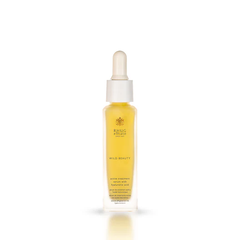Winter Wellness With Jo Fellows
Posted by TEAM WILD BEAUTY

If the thought of colder, darker days is spinning you into a winter slump, fear not, Jo Fellows offers her top tips to supercharge your winter wellness.
Your wellness doesn’t have to suffer during the long winter months – it is possible to shine bright all year long. All you need to do is develop proactive rituals that keep you happy, healthy, and energised to take on the season.
Get Outside…
Stepping beyond your front door into a natural, larger ecosystem will help invigorate your microbiome, which has a powerful effect on your immunity. Increased exposure to natural daylight helps to raise our serotonin (one of our body’s feel-good chemicals) levels too, helping to create a positive mood and alleviating depression.
If you succumb to every bug going round, feel constantly tired, have thinning hair, lower back or muscle pain or even feel depressed, you may have vitamin D deficiency. It’s made in our bodies after exposure to sunlight, so it’s not uncommon for people to become vitamin D deficient during the winter. Vitamin D helps us to absorb calcium and phosphorus, which are vital for healthy bones and teeth. It’s also crucial for a strong immune system.
Current NHS advice recommends a supplement of 10 micrograms of vitamin D during winter, and all year round if you are from an African, African-Caribbean or south Asian background.
Move Your Body…
It’s hard to motivate yourself to exercise when it’s cold, the mornings are dark and sunsets are early. But regular activity decreases our risk of heart disease and some cancers, gives us stronger muscles and bones and also contributes towards a healthy immune system. Those of us who exercise regularly may develop more infection-fighting white blood cells called T cells. Being active also helps to regulate the stress hormone cortisol, which, when raised for long periods, can lead to harmful levels of inflammation. And there’s also those feel-good post-workout endorphins.
The NHS recommends that adults should do 150 minutes of moderate-intensity aerobic exercise each week – that’s any activity that makes the body work hard enough to raise your heart rate, such as cycling or fast walking.
Keep it simple. Commit to something that fits in with your lifestyle. If running sounds too much, think brisk walk. As an advanced yoga teacher, of course I’d recommend a yoga class. Not only does it increase your flexibility, improve posture and balance, it also helps with focus and stress relief. If we’re in a lockdown, there are plenty of options available online.
Keep Drinking…
This isn’t about getting your fix of mulled wine or indulging in large mugs of hot chocolate. To stay healthy, experts advise drinking around eight glasses of water per day – it’s one of the most effective things you can do to improve your health and well-being.
It’s vital you keep hydrated to regulate your body temperature, to allow your blood to carry oxygen together with important nutrients, and to remove toxins from your body. The moisture will also help to make mucous membranes – such as those found in your sinuses – more resistant to bacteria.
Keeping well hydrated will keep your skin plumped up and clear. Water will improve your digestion, and keep your liver hydrated if you enjoy the (ahem) occasional alcoholic drink.
Keep Nourished…
One of the best ways to find comfort at this time of year is to enjoy a healthy, warming meal. Eat organic, locally produced seasonal foods not only taste delicious, but also help reinforce your natural microbiome and remember to mix up your choice of fruits and vegetables each week for variety. Incorporate the right nutrient-rich foods and you’ll help fend off the usual winter ailments such as colds, a sore throat and dry skin.
You can help to boost your immunity by eating foods high in vitamin C such as broccoli, citrus fruits, berries and dark leafy greens, foods high in vitamin A such as squash, dark leafy greens, sweet potatoes and carrots and vitamin D-rich foods such as eggs, meat, herrings, sardines and trout.
Healthy levels of iron are also needed for a robust immune system. Iron-rich foods include meat, poultry, fish and legumes. If you like garlic and ginger, their antimicrobial and antiviral properties can give your immune system a healthy boost.
Probiotics found in fermented foods work to keep our gut healthy,
which in turn fires up our immune response. To optimise their function, also consume prebiotics which can be found in legumes, oats, berries, bananas, leeks and onions.
Nourish Your Skin…
Cold, dry air mixed with a warm blast from your central heating system will quickly suck moisture from your skin. So, it’s important to give our skin a little more TLC during the winter, by building a barrier between it and the elements with moisture-rich creams.
I like to use organic products, so the Rhug Estate Wild Beauty range is perfect. On my body I love to use their Nourishing Body Cream with marshmallow root and lemon balm. I massage it into my skin each time I bath or shower, because I love the way its balancing blend of essential oils deeply hydrates and nourishes my skin. The fragrance is divine!
On my face, my favourite Wild Beauty products to use include the Active Treatment Serum with Hyaluronic Acid. This helps to keep my skin bright, soft and beautiful by promoting the regeneration of skin cells. I use it beneath the Hydrating and Protecting Skin Cream during the day and the Restorative Overnight Cream before I go to bed. This night cream contains Organic Evening Primrose Oil which helps to improve my skin’s elasticity and hydrates while improving cell turnover while I sleep.
My lips tend to dry out in winter, so I keep a little jar of Moisturising Lip Treatment with Rhug Beeswax in my pocket to have it handy to use as required throughout the day. It’s packed with vitamin A and really helps improve hydration.
Sleep Better…
Sleep is vital – it’s when your body repairs and recuperates. In fact, research shows that if we get less than six hours sleep a night, we’re four times more likely to catch a cold when exposed to a virus.
Our sleep cycle is regulated by melatonin, a hormone that’s released in response to light. Exposing yourself to too much light in the evening, for example from electronic devices, inhibits the release of melatonin which decreases sleep quality and quantity.
The Sleep Council recommends between seven and nine hours of sleep is optimal, but requirements can vary from person to person. Aim to sink into a slumber early enough in order to wake up naturally in the morning. If you’re having problems sleeping, try to get into a regular ‘waking up’ and ‘going to bed’ routine, keep your bedroom dark and quiet, exercise regularly, reduce stimulants (like coffee) and don’t eat or drink much 1-2 hours before you plan to sleep. Listening to a sleep meditation or a yoga nidra will also help to clear away the chatter from the mind.
Postures For Winter Wellness
Feel Good By Opening The ‘heart’:
When the weather is cold, we tend to naturally hunch our shoulders forward. But, for good posture and wellbeing, we should be actively doing the opposite. This feel-good gentle exercise is especially beneficial if you’ve been slouched over a desk all day.
Sit up straight or stand and relax your shoulders down, away from your ears. Keeping your breath even and steady throughout the practice, interlock your hands behind your back (or grab your elbows behind your back) and pull your hands down and back. Draw your elbows closer together, to feel your shoulders draw back, as the shoulder blades move toward each other and down your spine. Lift your collarbones. Slightly lift your chin (without scrunching your neck) to help stimulate blood flow to the thymus, which is instrumental in the growth of germ-killing T-cells. Hold for up to two minutes and release.
Resting with the legs on a chair or up a wall.
Bringing our legs above us helps to increase the flow of blood moving toward the heart. This means the heart doesn’t have to work as hard to circulate oxygenated blood throughout your body. This also helps to move lymph around your body strengthening the immune system. It feels wonderful to elevate the legs for 10 minutes at any time of the day, but especially before bedtime.




